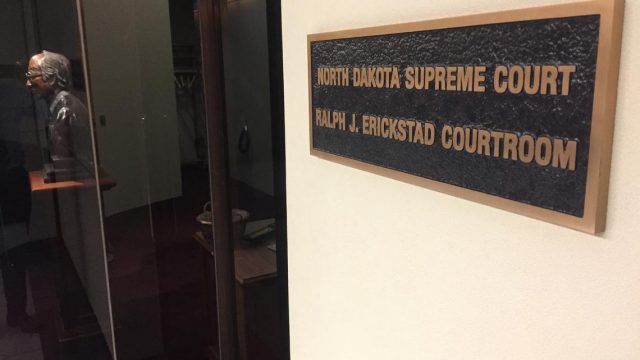Guest Post: North Dakota Supreme Court Has Authority to Suspend Evictions

This guest post was submitted by Fargo attorney Sean Foss.
Over the past week, Say Anything Blog has published several articles touching upon the North Dakota Supreme Court’s Order suspending residential eviction actions across the State during the current Covid-19 pandemic. While noting the Governor’s broad discretion under N.D.C.C. Chapter 37-17.1 during a declared “emergency,” these articles have failed to address or even recognize the Supreme Court’s parallel authority.
Section 27-02-27 of the North Dakota Century Code provides the Supreme Court with the authority to declare a “judicial emergency” in response to an “emergency or natural disaster that substantially endangers or infringes upon the normal functioning of the judicial system, the ability of persons to avail themselves of the judicial system, or the ability of litigants or others to have access to the courts or to meet schedules or time deadlines imposed by law or court order . . .” As part of an order declaring a judicial emergency, the Supreme Court “may suspend, toll, extend, or otherwise grant relief from deadlines, time schedules, statutes of limitations, statutes of repose, or filing requirements imposed by law,” except for constitutional deadlines and requirements. N.D.C.C. § 27-02-27(2).
Upon review of N.D.C.C. § 27-02-27, the Legislature has clearly provided the Supreme Court with the authority to make decisions, both substantive and procedural, about the operation of the court system during a judicial emergency.
The Supreme Court declared a judicial state of emergency on March 17, 2020. As the Court stated, “The pandemic presents challenges to the administration of the North Dakota Judicial Branch statewide. An emergency exists that substantially endangers and infringes upon the normal functioning of the judicial system in North Dakota. The pandemic poses a threat to individuals who come into contact with a court or judicial facility and personnel.” On March 26, 2020, the Supreme Court then issued Order 27, entitled “Emergency Suspension of Eviction Proceedings,” which suspended residential eviction proceedings “until further order of the Court.” When the Court issued this order, it was clearly acting within its statutory authority.
Evictions in North Dakota are governed by N.D.C.C. Chapter 47-32, which provides specific timeframes for courts to hear an eviction matter. Section 47-32-02 provides that an eviction must generally be heard by the court between 3 and 15 days after service of an eviction summons. While 3 to 15 days may not seem like all that short a period of time, many civil court proceedings take years to progress from issuance of a summons to a trial date. Under the Court’s Order, this time period is suspended indefinitely, leaving landlords without judicial recourse to remove tenants who have stopped paying rent or otherwise breached their lease.
To be clear, the Supreme Court’s Order does not permanently prevent any landlord from evicting a tenant. Rather, the Order simply provides “[a]ll residential eviction proceedings under N.D.C.C. ch. 47-32 are suspended until further order of the Court,” though a district court may proceed in a given eviction “[u]pon a showing of good cause.” In theory, a landlord may still file an eviction action with North Dakota district courts during the period of the suspension, and the landlord still has a substantive right to collect all back rent owed to the landlord up through the date of any eviction hearing. However, the landlord will not obtain their day in court until the Supreme Court lifts the suspension.
To be clear, whether the Supreme Court is authorized to suspend hearings for residential evictions is distinct from whether the Court is making a good decision. The criticism surrounding the Court’s Order focuses upon the idea that the Court has made a policy decision as opposed to an administrative one.
Because the Court has only suspended “residential eviction proceedings,” it is difficult to see the Court’s Order as anything other than an attempt to keep renters in their homes during this pandemic, regardless of the corresponding impact on the landlords. In theory, the courts are still open for commercial eviction proceedings, which are not affected by the Supreme Court’s Order. If the Court’s concern was solely about the public health issues created by holding eviction proceedings, the Order should apply to all evictions, not just residential. Similarly, if the Court’s concern is about public health, why did the Court not suspend all civil court proceedings?
While the wisdom of the Supreme Court’s actions will continue to be debated, the notion that the Court exceeded its legal authority should be put to rest. The Legislature clearly provided the Court with the authority to make these kinds of decisions when it enacted N.D.C.C. § 27-02-27, even if the Legislature did not anticipate the Court would exercise its discretion to promote a particular social policy.




